Regardless of the niche you specialize in, extending a business with a marketplace is all about benefits. But why? First and foremost, nowadays, everything is online. This format paved the way for businesses to provide exceptional quality services, 24/7 support, and lightning-fast transactions.
The firearms industry is no different. If you’re a business owner, both present and future, you already know how secure and responsible this type of business should be. In this matter, building a marketplace centered around firearms is the right way.
Therefore, in this article, we will overview everything there is to know about creating a firearms marketplace providing examples of the gun marketplace our team recently built. We will overview benefits, development steps, costs, and important aspects you should account for along the way.
Benefits of developing a gun marketplace website
To start with, building a marketplace is always a good idea, especially if you already have an established business. Not only can it extend your reach and capabilities, but it also provides tons of benefits. Hence, if you’re using an outdated website or don’t have one even, here’s what a dedicated firearms marketplace can bring to your business:
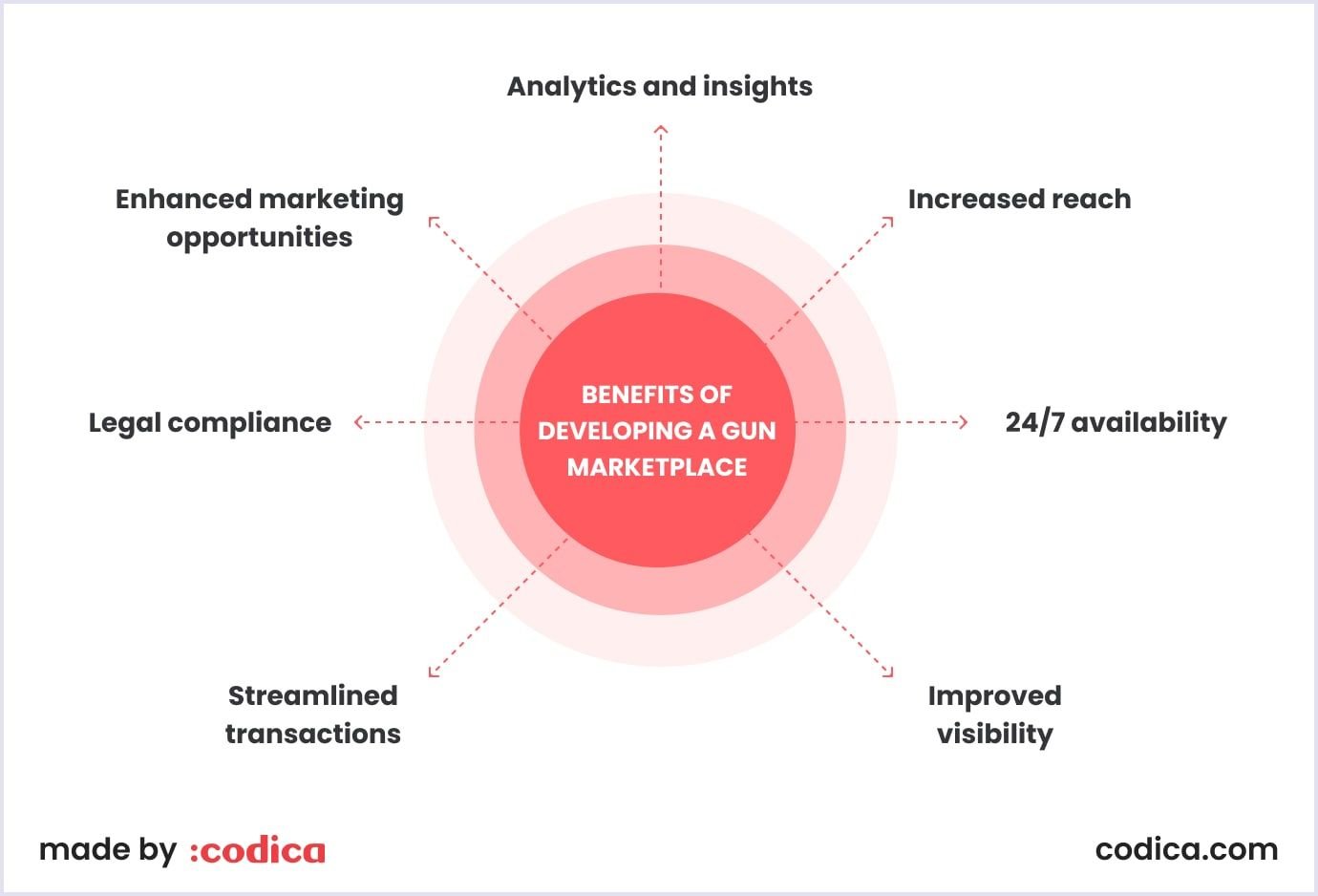
Increased reach. With an online marketplace, you can attract a huge audience beyond your local area. This way, you can cater to customers from different regions as long as it complies with firearm transfer laws.
24/7 availability. Unlike physical stores with set operating hours, any online marketplace is accessible 24/7. Therefore, such accessibility allows your customers to browse and make purchases at their convenience, increasing sales potential.
Improved visibility. In addition to reach and availability, a well-designed marketplace can improve visibility. In simple terms, your marketplace becomes easier to find online, appearing higher and more frequently in search results. Many techniques, like search engine optimization (SEO), for instance, can help in this matter.
Enhanced marketing opportunities. Apart from solely selling purposes, your future online marketplace can offer various marketing tools and strategies to promote products and attract customers. For instance, you can develop targeted advertising, email campaigns, and social media integrations. A proper marketplace marketing strategy can increase visibility even further and attract new customers.
Streamlined transactions. This is another huge benefit of any marketplace. Today’s advanced integrations allow businesses to create super fast and easy transactions. This can help you manage online gun sales more efficiently and reduce administrative overhead.
Legal compliance. Building a custom marketplace allows for integrating features to ensure compliance with relevant laws and regulations governing the sale of firearms. This can include age verification mechanisms, background check requirements, and adherence to local, state, and federal laws.
Analytics and insights. As your marketplace grows, tracking the analytical aspect of things is critical to plan for future updates. An online marketplace can provide valuable data and insights into customer behavior, preferences, and online gun sales trends. This data can be used to optimize marketing strategies, inventory management, and product offerings.
After all, the benefits of creating a marketplace for your firearms store go beyond the ones listed above. Nonetheless, even these benefits provide more than enough reasons to build a marketplace for your gun store. But to begin, there are more aspects to account for. Let’s, for instance, cover the main features your marketplace should have.

Main features of online guns marketplace in the US
Marketplaces are complex structures, and it’s a combination of features that makes them so efficient. In general, many marketplaces have similar core features due to the idea of the product. On the other hand, more specialized functionality is added depending on the niche and type of the platform.
For firearms-oriented marketplaces specifically, our specialists outlined the following features as the most crucial ones.
Inventory control and shipping operations
An efficient inventory management and seamless shipping operations are central to any marketplace's functionality. For a guns marketplace, this entails robust systems to track inventory, manage stock levels, and facilitate the shipping process. Sellers need tools to update their inventory in real time, ensuring buyers have accurate product availability information.
Additionally, integrated shipping solutions streamline the fulfillment process, providing tracking information and ensuring timely delivery while complying with relevant firearm shipment regulations.
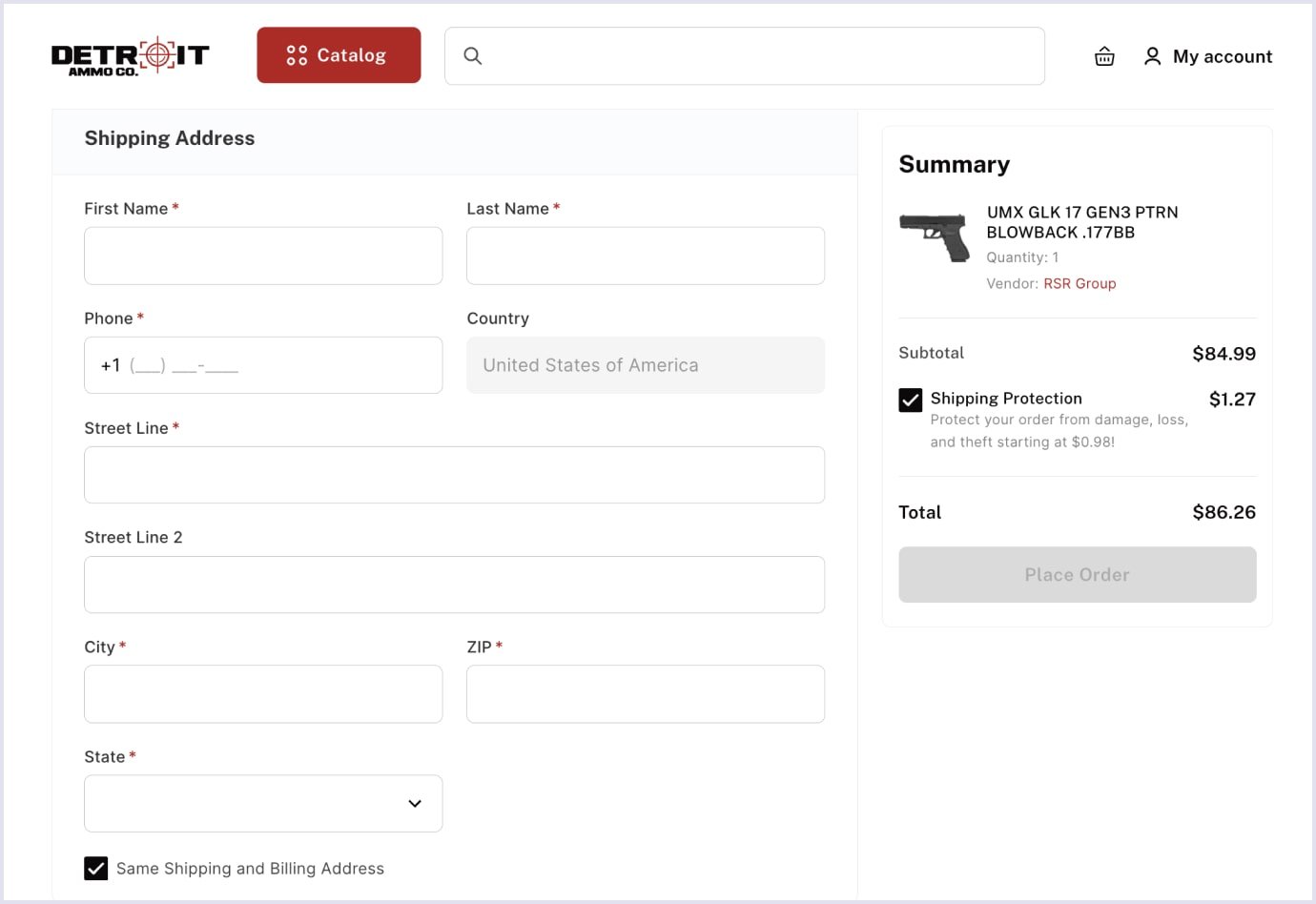
But, before we move on, let’s stay a bit longer on the shipping operations. The matter is, they are different from the regular ones when it comes to delivering firearms, ammunition, etc. In online gun purchasing marketplaces, shipping is organized differently. Instead of delivering guns directly to users, shops/dealers/marketplace are obliged to ship orders to a local dealer with a valid Federal Firearms Licence (FFL).
Thus, although it is legal for you to sell guns online, unlike other eCommerce products, you can’t ship guns and gun accessories straight to the customer. Instead, you must send the product to a local, licensed firearm dealer or other FFL holder.
Another point to consider is that this local firearm dealer will also charge a small fee at the customer's expense to provide the shipped product to the customer under all terms required by that state’s gun regulations.
Robust security measures and verification systems
Security is paramount in the online sale of firearms. Therefore, this is an area that needs attention and investment. In this regard, implementing robust security measures involves the following:
- Stringent identity verification processes to ensure that only eligible buyers can purchase firearms. Additionally, it should work vice versa, i.e. providing a verification process for sellers if you plan to involve third-party sellers in your marketplace. This way, customers will know they purchase firearms from a licensed and experienced vendor.
- Age verification and compliance with background check requirements as mandated by federal and state laws.
- Federal Firearms License (FFL) availability from sellers. This verification method is also mandatory in the US, as it allows an individual or a business to sell, manufacture, and import firearms, ammunition, and certain other devices.
- Firearm Owner’s Identification (FOID) checks. It is issued by state authorities that allows residents to legally purchase and possess firearms and ammunition. It serves as a form of verification in Illinois, which is currently the only state that mandates a FOID card for firearm and ammunition ownership.
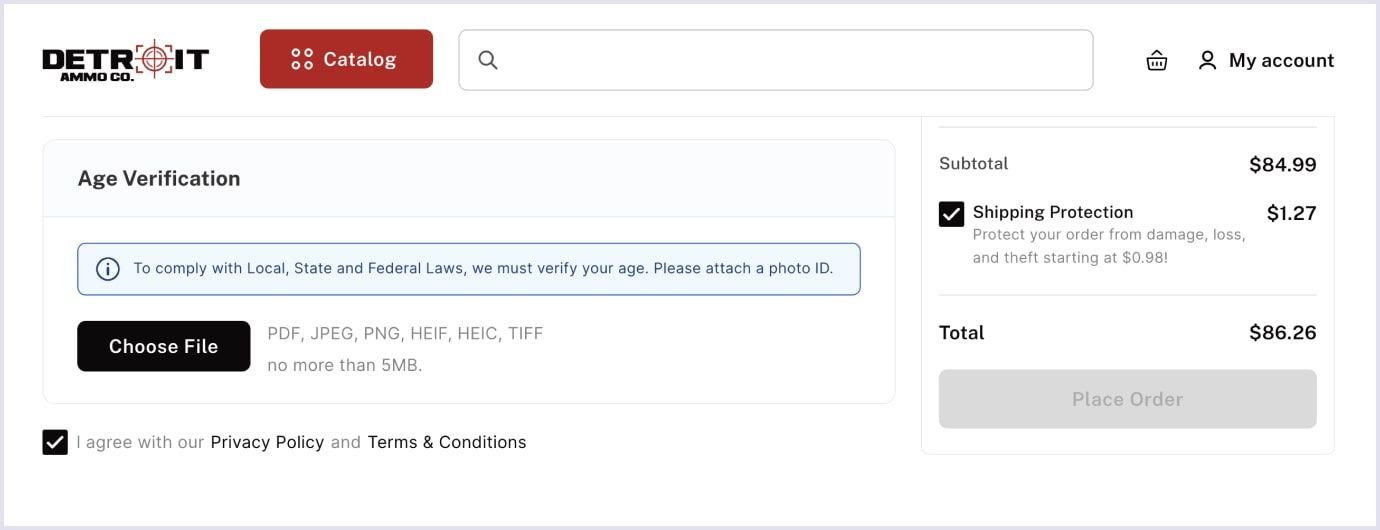
Leveraging advanced authentication technologies and encryption protocols helps safeguard sensitive information and prevents unauthorized access to firearm listings and transactions.
Analytical functionality
Marketplaces are capable of working with dozens and hundreds of transactions daily. Unlike in offline stores, these operations are more challenging to keep track of. Therefore, analytical functionality for your marketplace is a must.
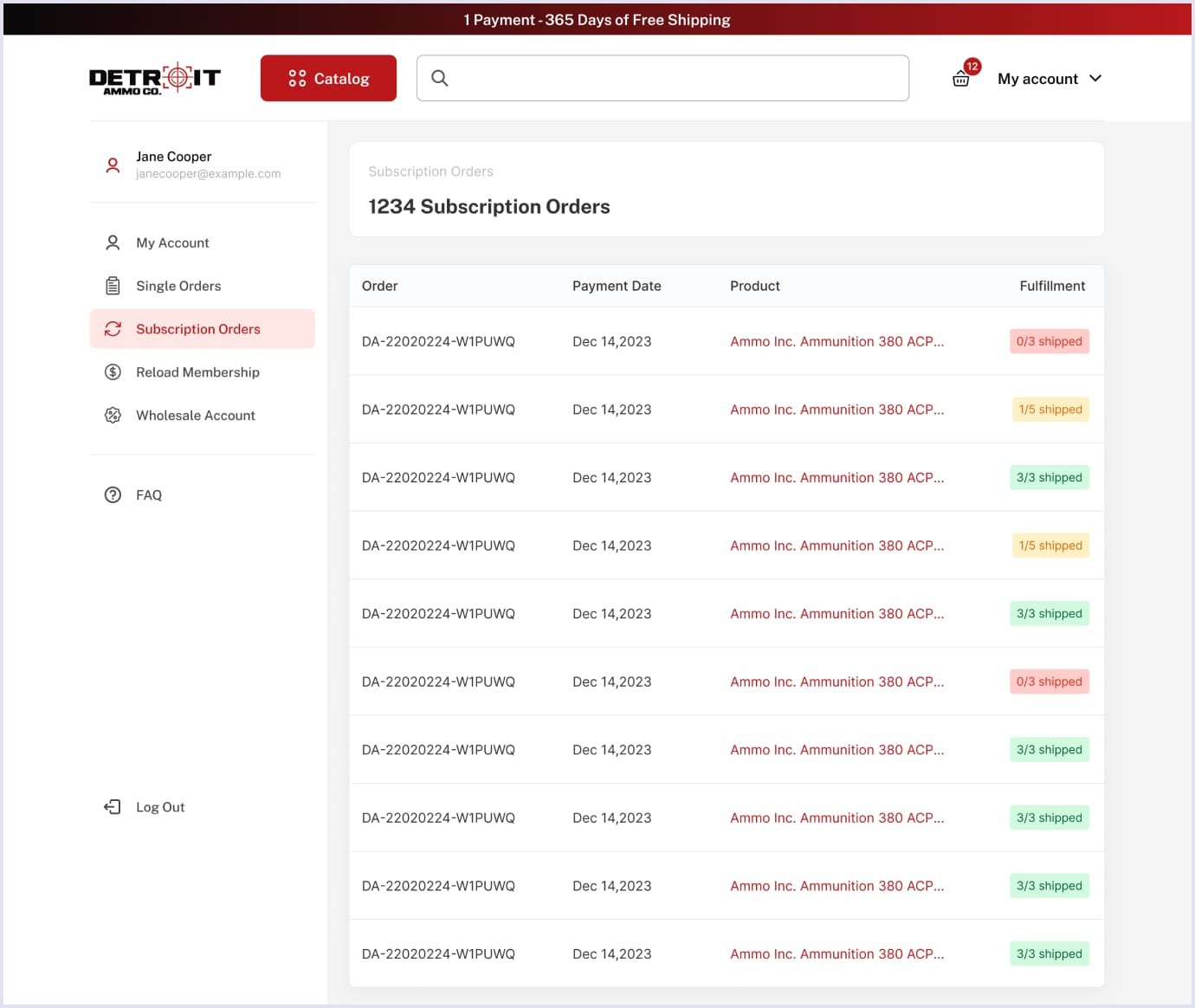
With properly set up analytics, you can:
- Track sales metrics and their volumes;
- Monitor trends and purchasing patterns;
- Improve business processes in your gun marketplace;
- Monitor your buyers' demographics, age, gender, and other important statistical details;
- Analyze customers’ behavior;
- Identify popular and bestselling products to optimize pricing strategies.
After all, analytics enable continuous improvement of business processes, enhancing efficiency and driving revenue growth in the marketplace ecosystem.
Online payment processing
Seamless and secure online payment processing is essential for any marketplace as it facilitates transactions within the platform.
Third-party integrations play a huge part in making payments secure and fast. Therefore, implementing trusted payment gateways like PayPal and/or Stripe enables buyers to make purchases conveniently while ensuring the security of their financial information.
Additionally, compliance with the Payment Card Industry Data Security Standard (PCI DSS) and adherence to regulatory requirements enhance trust and confidence among buyers and sellers, facilitating a frictionless payment experience in the online guns marketplace.
Tax automation
Tax compliance is a critical aspect of operating a gun marketplace. Automating tax calculations and reporting simplifies the process for sellers, ensuring compliance with state and local tax laws.
By integrating tax automation solutions, marketplace operators can accurately calculate and collect applicable taxes, reducing the burden of manual tax management and minimizing the risk of non-compliance.
Support and service to gun buyers online
Providing exceptional customer support and service is essential for fostering trust and loyalty among buyers. Firearms and ammunition are simple products, as they all require special treatment and an understanding of their specific parameters. Therefore, solid customer support is a mandatory aspect of your future gun marketplace.
But what exactly should this support be? For instance, your marketplace should have a live chat with a vendor, email support, and comprehensive FAQs. The more options you offer your buyers, the better, as these features enable them to seek assistance and resolve inquiries promptly.
Additionally, your platform should have a dedicated educational page. Educational info can be placed on a separate page or under the description of every product. Educating buyers about firearm regulations, safety guidelines, and the purchasing process enhances their confidence and satisfaction when navigating the marketplace.
A user-friendly website
A website understandable at a glance is another game changer. Although it’s not really a feature, it is still an irreplaceable aspect of a successful marketplace. There are several aspects forming a user-friendly design
Comprehensive product descriptions
Detailed description is what helps your users choose the product. Not only they should be mistake-free, but also provide a detailed overview of the product, with everything the buyer should know before the purchase.
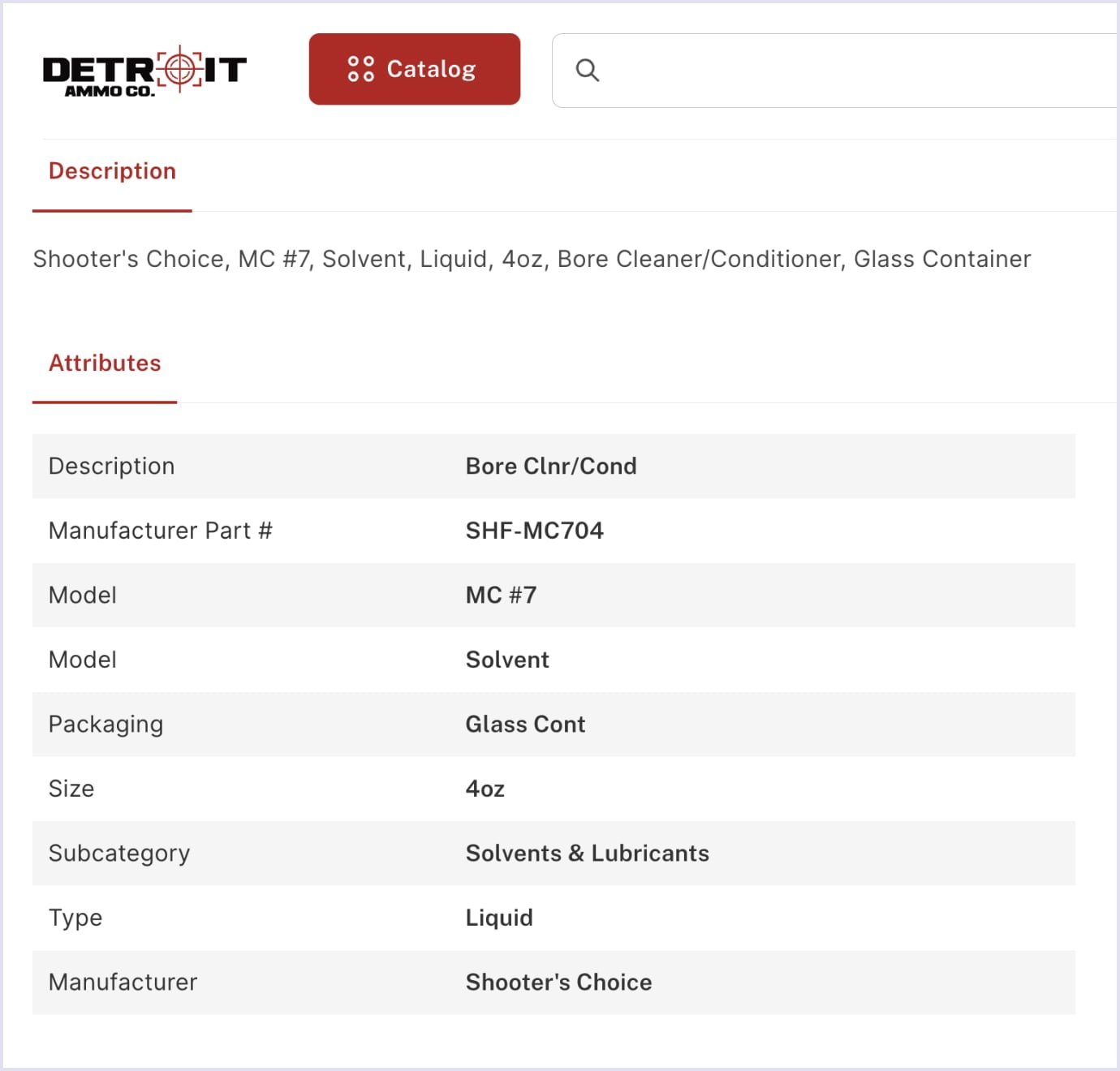
High-quality images
Superb imagery is essential for selling products. Images on your marketplace should not only be high-quality, but also be in the same style, with similar lighting, background, etc. If you feel that this is achievable, it will greatly improve the overall feeling of your marketplace. Additionally, consider adding videos, gifs or even 3D models of your products as they can greatly help customers with choice.
User-friendly navigation. Marketplaces tend to grow big and to avoid confusion when finding certain products, a thoughtful navigation system is a must. First, you can add breadcrumbs, a special bar which displays where users are currently browsing.
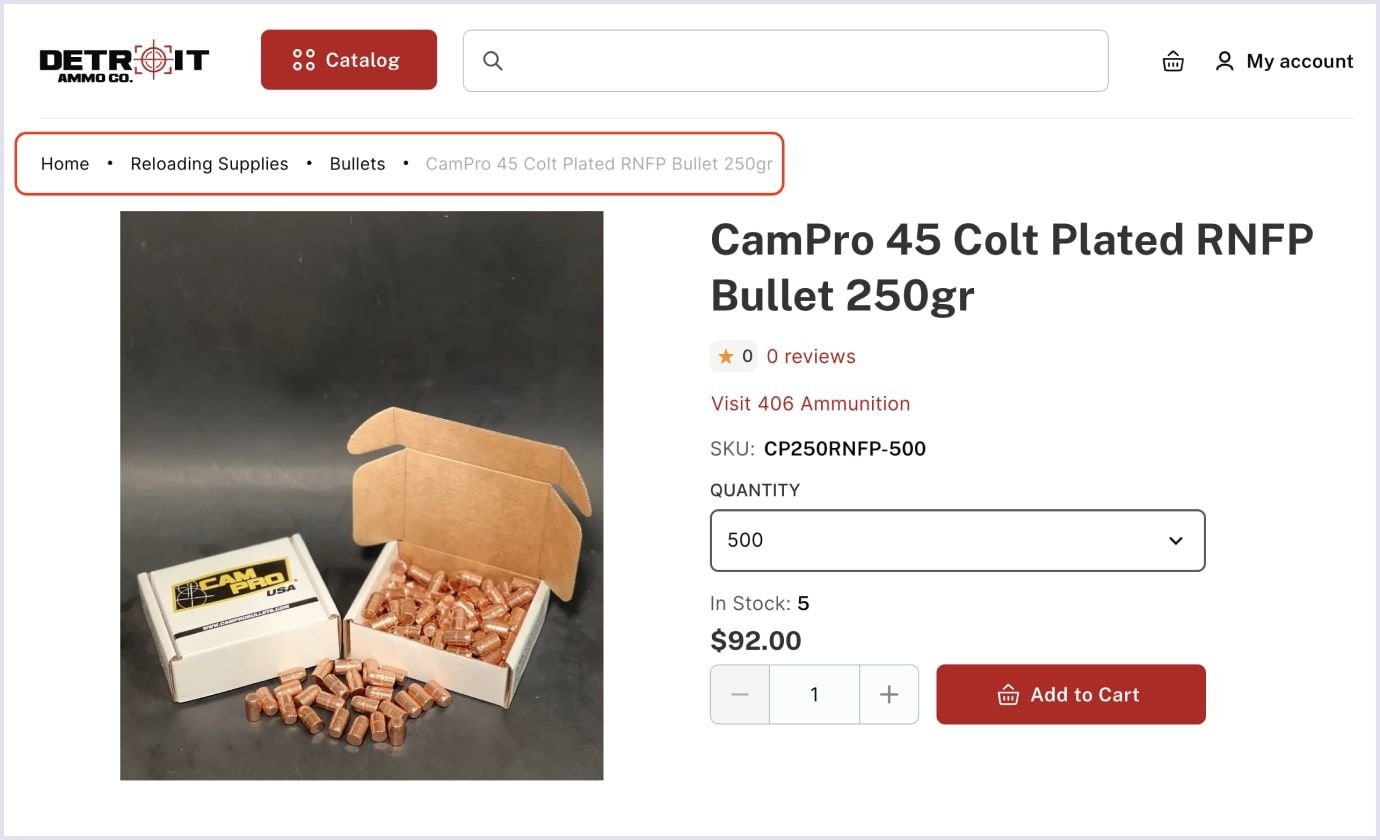
Additionally, make sections of your marketplace readable, say if users are browsing handguns specifically, the section should be named accordingly. Then, provide neat buttons for switching to other categories without the need the return to the home page and start searching for something else all over again.
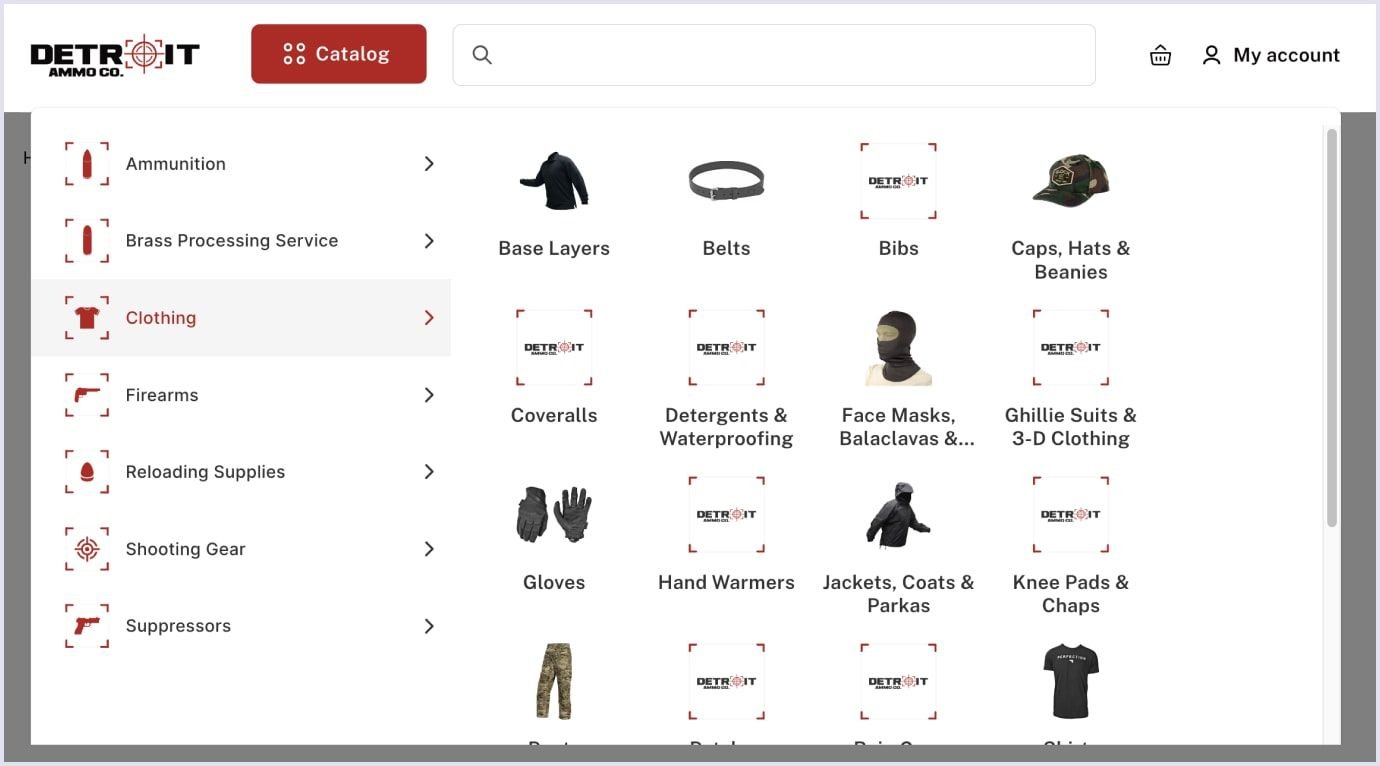
Consistent style. For a marketplace to look professional, you should adhere to consistency in all user interface (UI) elements. This includes using the same font family, image style, color scheme, and tone of voice throughout the marketplace.
Optimized for both desktop and mobile devices. Nowadays, mobile users outnumber desktop users, literally forcing websites to create mobile versions.
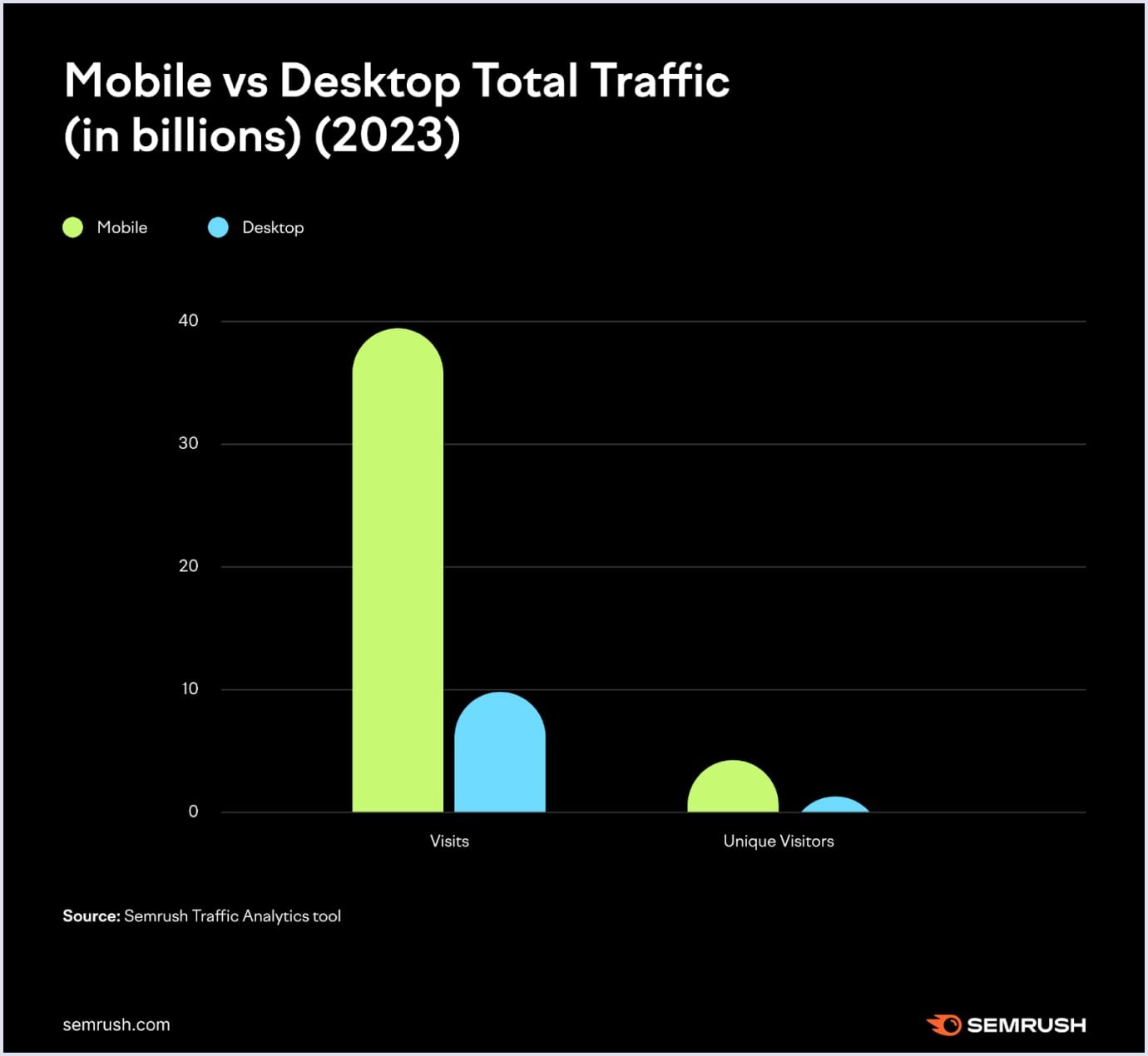
Therefore, your marketplace should also account for this aspect, providing a superior mobile version to cater for these users. Additionally, it should not simply resemble the main desktop site, but also account for various screen sizes and optimize performance to make the performance seamless.
Accessibility. Accounting for users with special needs went beyond a trendy thing and became a standard for all platforms. In this regard, you should also account for it, providing accessibility features for users. They include different color modes, zoom, audio descriptions, dictate option and many others.
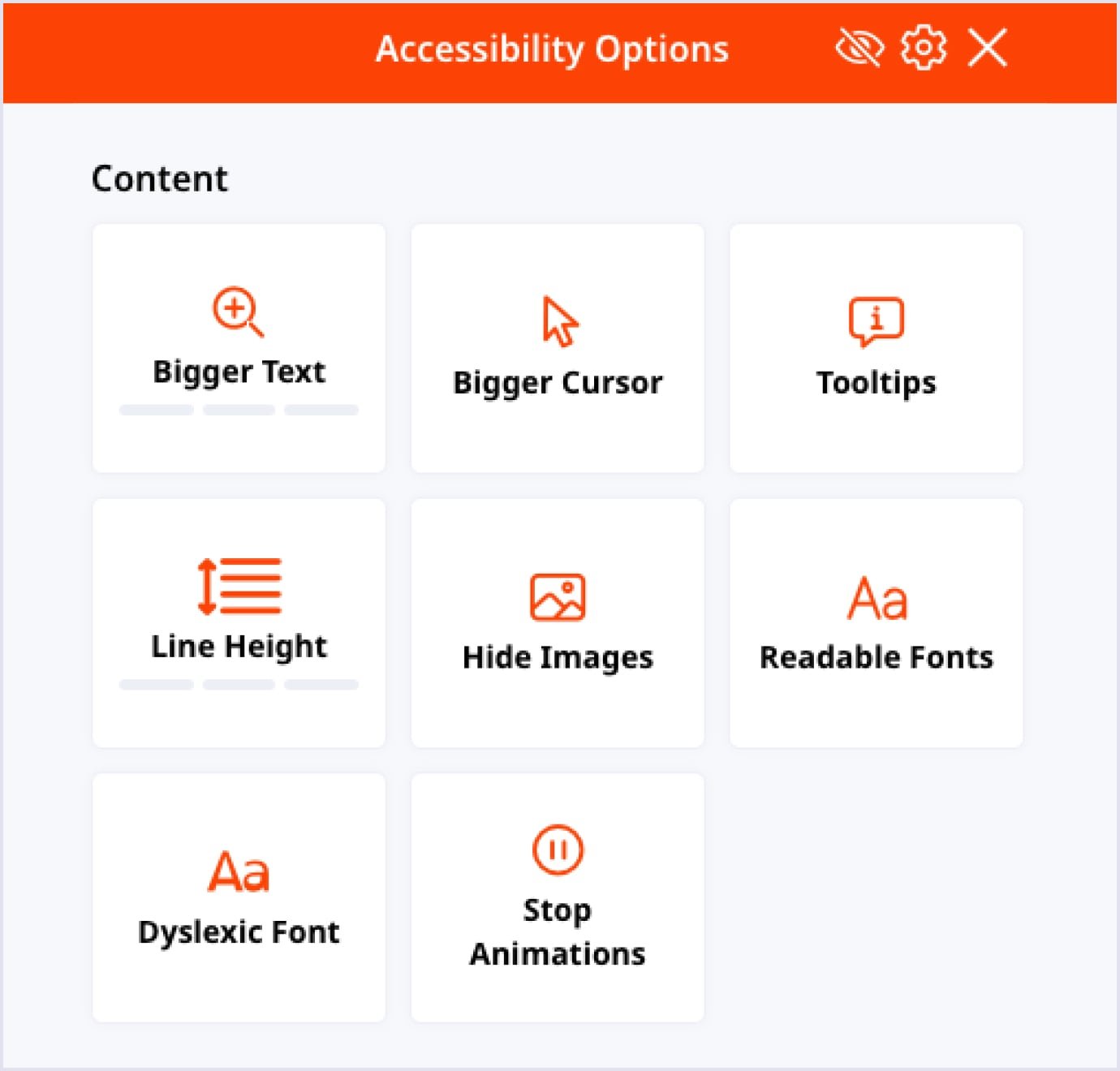
Search system/filtering/sorting. The more products a marketplace offers, the more difficult it becomes to find the right one. Hence, a thoughtful search system is what you need. It, for instance, allows users to search for goods by keyword, brand, color, and other variables. Additionally, a filtering and sorting system should be implemented for people looking for popular, cheapest/most expensive items.
Main steps to develop a firearms marketplace
Developing a custom gun marketplace isn’t easy, as it is a complex task with dozens of moving parts. Thus, let’s tackle it in Codica way by dividing the development process into sizeable milestones. We adopted this approach years ago, which hasn't failed us once.
On the contrary, it provides us with much-needed flexibility, allowing us to deliver software at our maximum capacity. Typically, it begins with the product discovery.
Product discovery
The majority of projects we work on begin with product discovery services, which serve as an initial step in custom software development. During this phase, we thoroughly research and analyze your idea to create a solution that meets your expectations, ideas, and needs.
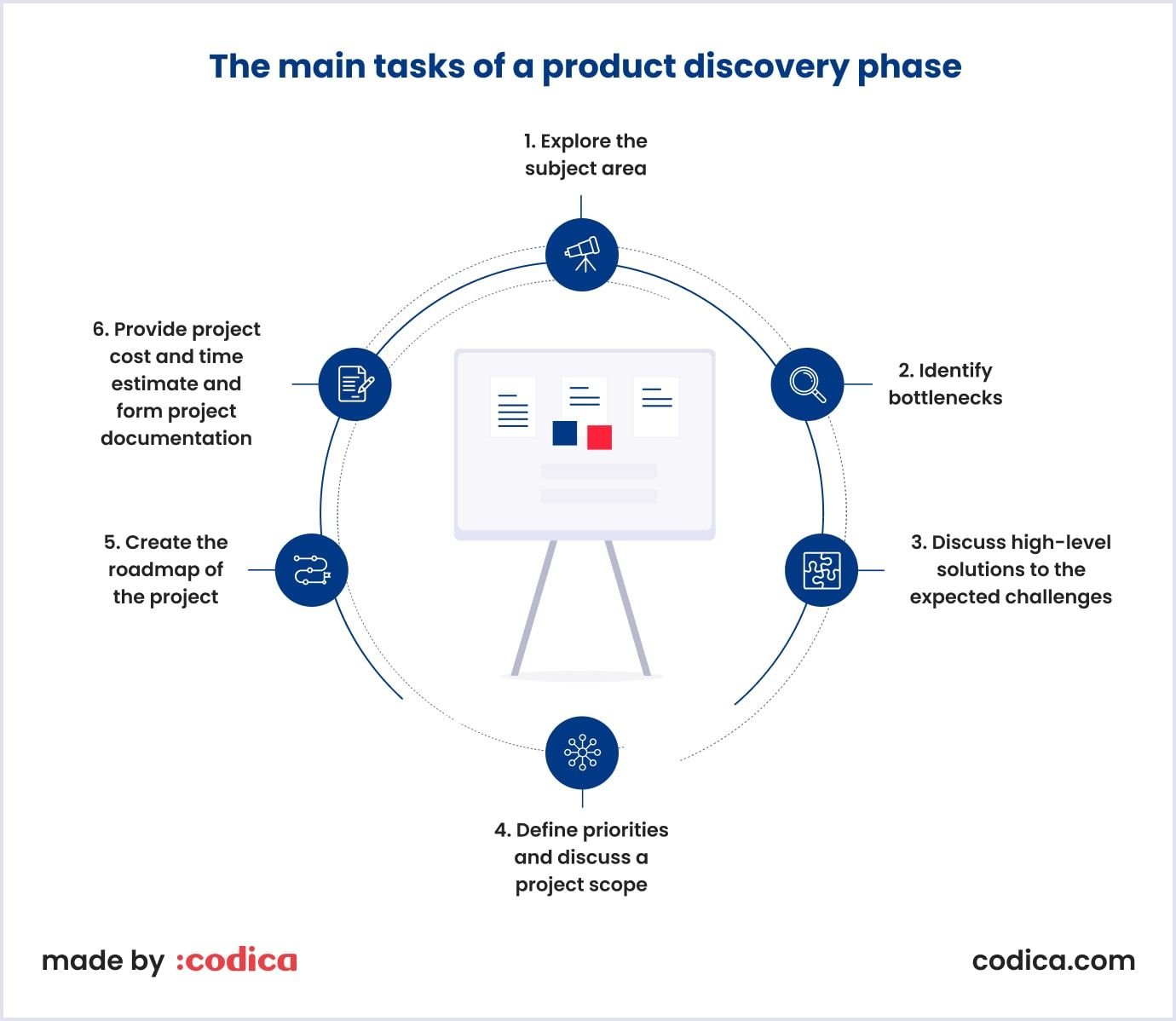
For the gun marketplace specifically, discovery can help by:
- Providing an in-depth look at the market you’re about to enter with your product. We analyze how fierce it is, who the key competitors are, and more.
- Analyzing competition you may face after launching a marketplace. This includes analyzing their key propositions, marketing strategies, and other important metrics.
- Overviewing the area of operation of your marketplace. We list what laws your marketplace should account for, what region-dependent features it should have, what primary language it comes in, and more.
- Minimizing risks and costs. With in-depth analysis that product discovery anticipates, we create a solid foundation for a unique product that has every chance of becoming a top marketplace in the niche.
In short, discovery sessions help us identify the software’s strengths and weaknesses early on. These services help clients reduce risks, increase efficiency, minimize costs, and avoid rework.

UI/UX design
Right after the product discovery comes UI/UX design service, which is an irreplaceable step to ensure your marketplace looks and, more importantly, feels professional. Our iterative design development process ensures consistent project delivery while adhering to our company's quality standards. As with other processes, we divide it into smaller milestones. They are as follows:
Research. This step is closely intertwined with the product discovery. At this stage, the client shares their product vision, and we study the project's subject area. We identify user needs and challenges, analyze similar web products, and offer implementation ideas.
Prototyping. After the research is conducted and the idea is more or less clear, we move on to prototyping. It implies creating gray-blue prototypes to focus on the project’s architecture without the distraction of color and font. Our specialists consider the logic of future user roles and create flows for each (user journeys). After this step, we usually create clickable prototypes to demonstrate the marketplace’s flow to the client.
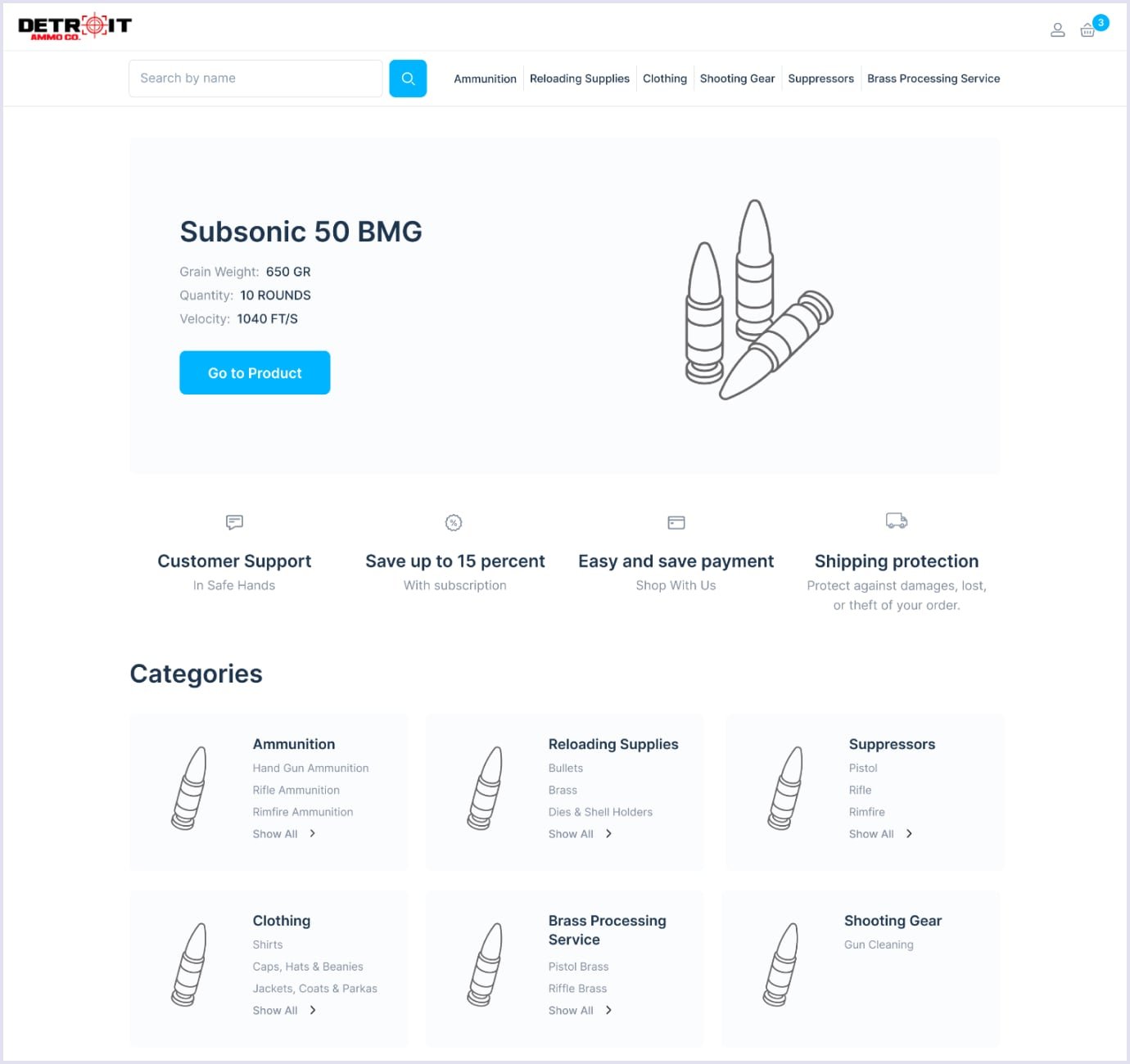
Visualization. At this step, we enliven the prototypes, enhancing them with logos, fonts, and colors. Essentially, we create a full-fledged marketplace on paper to let our clients fully see the marketplace and add remarks where they see fit.
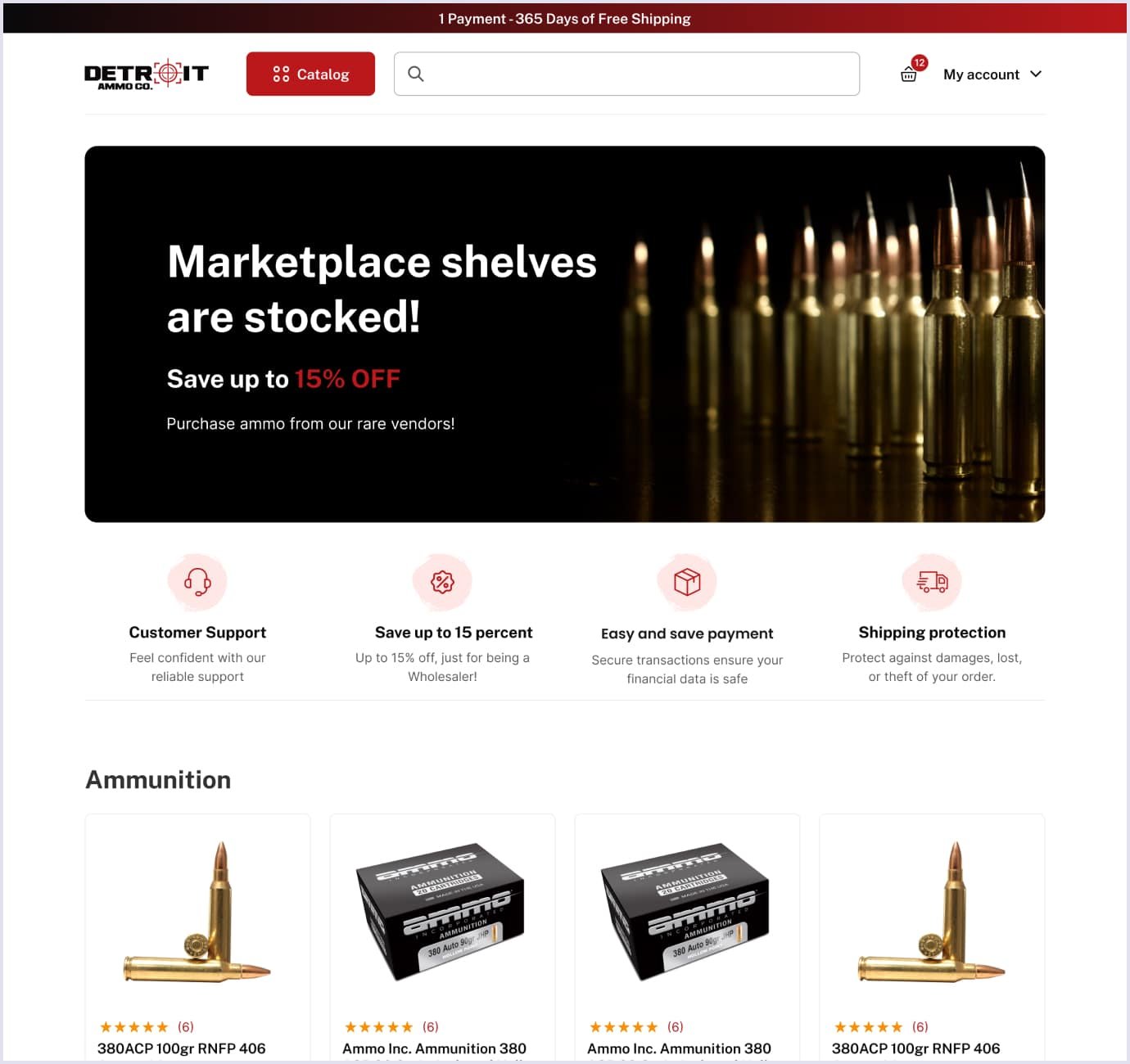
Design. Based on the visual part, we create a guideline for developers that will create the marketplace. Our designers meticulously detail heading sizes, fonts, button colors, and other design elements. Then, we design all pages, including mobile and desktop versions.
Recommended reading: Building a Future-Ready Marketplace with MACH Architecture
Development
At this point, when all the research and design are done, our specialists begin developing your marketplace from scratch. It is usually divided into frontend and backend development, where the latter is responsible for creating architecture and establishing the marketplace’s connection with databases and servers.
Frontend developers, in turn, not only create the visual part of the marketplace, enlivening the design but also set up all interactions within the platform, integrating application programming interfaces (APIs) and third-party services.
In the case of Detroit Ammo Co, our team provided services to redesign the platform's architecture, enhancing its user-friendliness. We completely rewrote the existing functionality using Ruby and Next.js and developed all necessary features. Speaking of the tools and languages used, our tech stack included:
Server-side
- App server: Puma;
- Language: Ruby;
- Framework: Ruby on Rails;
- Database: PostgreSQL;
- Container: Docker;
- Search engine: ElasticSearch;
Client-side
- Frontend framework: Next.js (React);
- HTML/CSS framework: Material UI;
Additional
- Hosting: AWS;
- Cloud storage: Amazon S3;
- Database storage: Amazon RDS.
Testing
Quality assurance services, or QA testing, in short, is the next natural step after the development ends. Our QA team enables you to reduce costs and increase your marketplace’s efficiency by focusing on what needs to be enhanced. In this regard, our services can help with:
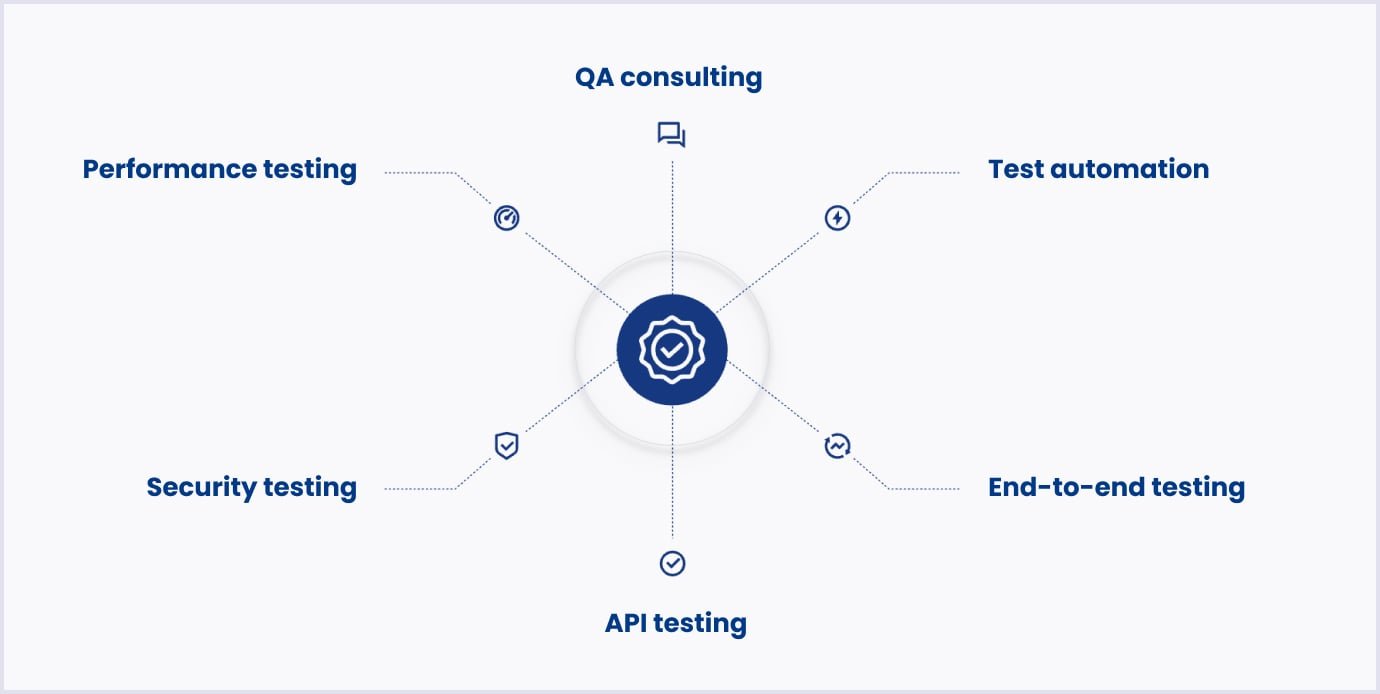
QA consulting
We assess the marketplace in its current state and recommend improvements to enhance its effectiveness. Thus, whether you're starting a gun marketplace from scratch or refining existing QA services, our consulting ensures your testing approach is robust and efficient.
Test automation
Automated testing streamlines the marketplace process, increasing productivity and expanding test coverage. By using advanced automation tools, we help you detect issues faster, reduce manual effort, and ensure consistent test execution.
End-to-end testing
Our comprehensive end-to-end testing services ensure your gun marketplace functions correctly across all stages and platforms. This thorough approach verifies that the entire solution flow operates seamlessly, providing a smooth user experience.
API testing
This process ensures that your application programming interfaces meet all reliability and performance expectations. We verify the functionality, security, and performance of your APIs, ensuring they communicate effectively and handle data correctly.
Security testing
Our QA testing team identifies and addresses security gaps and vulnerabilities in your marketplace. We perform rigorous security assessments to protect your platform from potential threats, ensuring data integrity and user safety.
Performance testing
Our in-house QA team evaluates how your system performs under specific workloads. We simulate real-world usage scenarios to identify bottlenecks and optimize performance, ensuring your application remains responsive and reliable under varying conditions.

Maintenance
Once everything is built and deployed, there is still work left to do and it’s name is maintenance. Even though the marketplace is fully working, maintenance is always required as the marketplace has to be managed.
For instance, developers have maintain databases and servers. QA specialists, in turn, monitor the platform’s performance and address issues. Marketers work on the content for the marketplace. As you can see, the list can go on and on.
Even now, the Codica team supports Detroit Ammo Co we mentioned earlier. In this case, even though we’ve built the platform, our specialists keep enhancing protection against spam attacks, adding automation tools for admins, and improving processes for users to ensure a seamless experience.
Read also: How to Create a Multi-Vendor Marketplace Website
Choosing between a ready-made solution and a custom software development
When creating a marketplace, choosing between an out-of-the-box and custom-made solution is quite common. In fact, both approaches offer advantages and considerations that warrant careful evaluation. So, let’s consider both.
Ready-made solution
You might wonder, what are they exactly? Ready-made solutions typically come pre-packaged with essential features such as user authentication, product listings, payment gateways, and basic inventory management. They are easy to set up, yet they offer very limited flexibility and functionality.
In short, off-the-shelf solutions are perfect for companies with limited resources or time constraints. Also, the setup and launch processes require minimal technical expertise. After all, ready-made solutions for online gun sales websites are a convenient option for businesses aiming to establish an online presence swiftly. Yet, they have very clear disadvantages. Let’s compare those next.

Advantages
- Time and cost efficiency. Ready-made solutions significantly reduce development time and costs associated with building a marketplace from scratch. Using pre-existing frameworks and templates, businesses can expedite the deployment of their online platform.
- Proven functionality. Established solutions often undergo rigorous testing and refinement, ensuring reliability and stability. This minimizes the likelihood of encountering major technical issues or bugs upon deployment.
Limitations
- Limited customization. While ready-made solutions provide a foundation for online marketplaces, they may lack the flexibility to accommodate unique business requirements or branding preferences. Customization options are often limited to superficial changes, restricting the ability to tailor the platform to specific needs.
- Generic features. Off-the-shelf solutions may include features that are not pertinent to the firearms industry or overlook critical functionalities specific to gun marketplaces, such as compliance with firearm regulations, background check integration or age restrictions.
- Dependency on vendor. Businesses relying on third-party solutions are subject to the vendor's updates, support availability, and pricing models. This dependency can pose challenges in terms of adaptability and long-term cost management.
- Poor scalability. Marketplaces tend to grow, hosting more vendors, catering to more customers, and offering more products. Many off-the-shelf solutions rarely account for growth and, thus, are difficult, perhaps even impossible, to scale.
Custom software development
Compared to ready-made solutions, custom software development from scratch offers way more in every possible aspect. Unlike off-the-shelf solutions, custom development empowers your gun store to exercise full control over the design, functionality, and scalability of your future online platform.

Advantages
- Tailored functionality. Custom development enables businesses to implement features and functionalities specifically designed for the firearms industry, such as compliance management tools, advanced search filters, and integration with regulatory databases.
- Brand differentiation. By crafting a custom marketplace, companies can establish a distinct brand identity and user experience that sets them apart from competitors. Customized interfaces, branding elements, and user workflows contribute to a more immersive and memorable online shopping experience.
- Flexibility and scalability. Custom solutions offer unparalleled flexibility, allowing for seamless integration with existing systems, APIs, and third-party services. This flexibility enables businesses to adapt and evolve their marketplace in response to changing market dynamics and customer needs.
- Custom reports and dashboards. As marketplaces tend to grow huge, implementing analytic features becomes essential. Fortunately, marketplaces built from scratch can account for this functionality, providing advanced tools to track marketplace’s performance, numbers of online gun sales, and dozens of other metrics.
Limitations
- Higher upfront investment. Compared to ready-made solutions, custom software is more expensive due to the need for comprehensive planning, design, and development phases. Yet, this aspect is highly dependent on the location of your development partner and its expertise. Later on, we’ll discuss it in more detail.
- Extended time to market. Building a custom marketplace from scratch requires time-intensive development, testing, and iteration cycles. As a result, the time to market for custom solutions may be longer compared to off-the-shelf alternatives.
- Technical expertise requirement. Custom development requires a team of skilled developers, designers, and project managers capable of translating business requirements into functional software solutions. Fortunately, by choosing a reliable business partner, you can completely offset this limitation.

In the decision-making process of choosing between a ready-made solution and custom software development for firearms marketplaces, careful consideration of the business's unique needs, resources, and long-term objectives is utterly important.
To sum up, while ready-made solutions offer convenience and cost efficiency, custom development provides unparalleled flexibility, scalability, and brand differentiation, which is a perfect foundation for a successful marketplace.
Ultimately, the optimal choice depends on striking a balance between immediate requirements and long-term strategic goals, ensuring the alignment of technology solutions with business aspirations in the dynamic landscape of online firearm commerce.
How to choose the right development partner
Choosing the right development partner is a crucial step in launching your online firearm store. Your development partner will not only help you build a functional and secure ecommerce firearms marketplace but also ensure that it meets all regulatory requirements for selling guns online in the US. Here’s a comprehensive guide to help you select the ideal development partner for your gun store business.
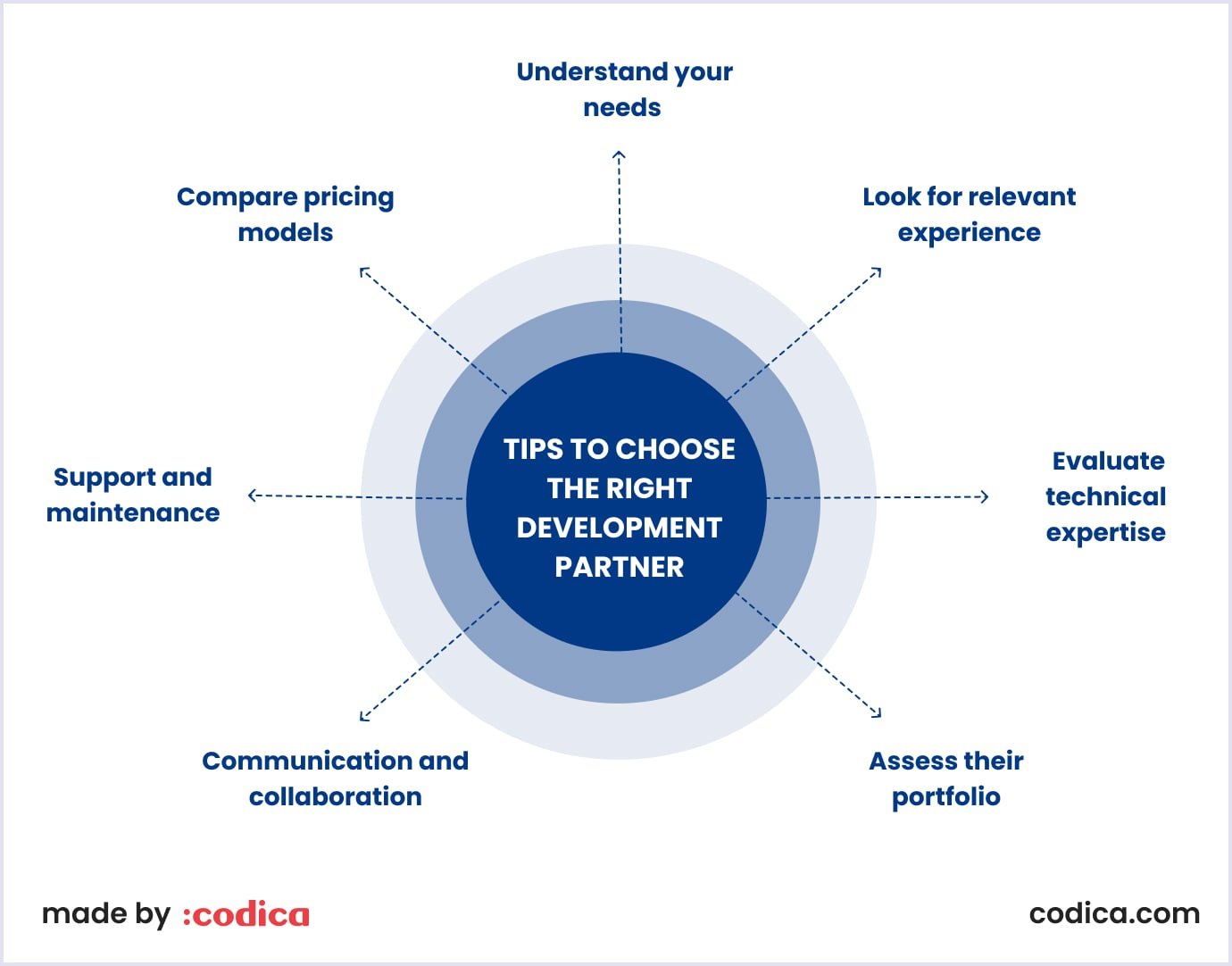
1. Understand your needs
Before you start looking for a development partner, it’s essential to have a clear understanding of your business needs and objectives. In this matter, consider the scope of your project first. In simple terms, define the features and functionalities you need, like inventory management, secure payment processing, customer relationship management (CRM), and compliance with federal, state, and local firearm laws.
Next, consider your budget and how much you are willing to invest in developing your online store. Additionally, set a realistic timeline for the project, considering any deadlines for launching your business.
2. Look for relevant experience
When selecting a development partner, experience in building ecommerce platforms is crucial. However, given the specific nature of an online firearm store, look for the following:
- Experience in regulated industries. Choose a partner with a proven track record in developing websites for highly regulated industries, as they will be familiar with compliance and security requirements.
- Expertise with marketplaces. Essentially, marketplaces are very demanding when it comes to planning, development, design, and testing. The main reason is their extensive size and potential growth. Thus, look for a partner who has extensive experience creating marketplaces in various niches and with different functionalities.
3. Evaluate technical expertise
Needless to mention the development partner of your choice should possess strong technical skills to build a robust and secure online store. When it comes to creating a gun marketplace, here are the key aspects to consider:
- Ecommerce development. Expertise in building user-friendly and scalable ecommerce platforms.
- Security. Knowledge of implementing advanced security measures to protect sensitive customer data and prevent unauthorized access.
- Compliance. Familiarity with the legal requirements for selling firearms online, including FFL integration and compliance with ATF regulations.
4. Assess their portfolio
Review the potential partner’s portfolio, as it is one of the biggest indicators of their expertise. When reviewing the portfolio, look for what is the most relevant to you: marketplaces, ecommerce projects, etc.
Additionally, pay close attention to the approaches the company uses to solve their online gun sales issues. This includes design techniques, specific functionality, marketing efforts, etc.
Lastly, customer reviews and testimonials are another important aspect. Always check feedback from their previous clients to understand their strengths and weaknesses. Additionally, look up relevant platforms like Clutch, where people often leave feedback on their collaboration with certain companies.

5. Communication and collaboration
Effective communication is vital for the success of your project. Thus, ensure your future development partner shares this idea. They should have clearly outlined processes how the communicate both internally and with their clients.
For instance, you, as a client, should be offered a convenient and consistent updating system where the team informs you of the project’s progress and any challenges encountered.
Additionally, your partner should also be responsive in a timely manner. You shouldn’t encounter problems reaching them and receiving updates on the project.
6. Support and maintenance
Launching your online firearms market is only half of the process. Another half lies in ongoing maintenance, support, and bug fixes (if any). Therefore, look for partners who offer long-term support, marketing services, etc.
After all, regular updates and maintenance are crucial to keeping your website secure and running smoothly. You should also check if they offer training for you and your team to manage the website effectively.
7. Compare pricing models
Development partners may offer different pricing models, such as fixed-price contracts, hourly rates, or retainer agreements. Evaluate which model suits your budget and project scope. Ensure there are no hidden costs and that the partner provides a detailed breakdown of their pricing.
How much will it cost to develop a custom online gun store?
Frankly, costs for developing marketplaces vary a lot. The main reason for this lies in varying functionality. Additionally, there are many other aspects forming the price. Let’s collect them all in one place and calculate the approximate price for creating a gun marketplace MVP.
| Costs of creating a firearms marketplace MVP | ||
| Features | Time, hours | Cost ($50/h) |
| Design | ||
| UX Development | 64 | $3,200 |
| UI Development | 96 | $4,800 |
| Architecture | ||
| Project setup | 24 | $1,200 |
| DB structure | 32 | $1,600 |
| Integrations | ||
| Payment (Stripe or PayPal) | 72 | $3,600 |
| Shipment (Shippo) | 64 | $3,200 |
| Main functionality | ||
| Authorization and Security | 72 | $3,600 |
| User Profiles | 42 | $2,100 |
| Homepage | 64 | $3,200 |
| Search and filters | 72 | $3,600 |
| Product page | 32 | $1,600 |
| Reviews & Ratings | 48 | $2,400 |
| Shopping cart | 84 | $4,200 |
| Notifications | 32 | $1,600 |
| Buyer panel | 96 | $4,800 |
| Vendor panel | 120 | $6,000 |
| Admin panel | 80 | $4,000 |
| Wishlist | 32 | $1,600 |
| Non-development activity | ||
| Project management | 72 | $3,600 |
| Quality assurance | 92 | $4,600 |
| Code review | 36 | $1,800 |
| Total | 1326 | $66,300 |
Note that an hourly price of $50$ is more or less common throughout Eastern Europe, whereas in Western Europe or the US, it can be twice as much.
Bottom line
From our perspective, we sincerely hope this extensive breakdown has been helpful to you. If so, feel free to contact us as our expertise allows us to guide you through every possible step of marketplace development.
To leave the doubts behind, check out our portfolio, which shows our experience with marketplace development. Besides, our blog highlights other important aspects of ecommerce software development which you may find helpful in your case.
On a closing note, extending your gun store with a marketplace is not simply a good idea. It is a natural business extension that brings it to a whole new level. Therefore, such a huge step requires thorough planning and a solid investment.

